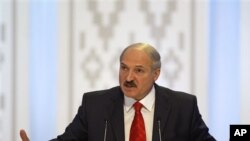Images of Belarus police clubbing presidential candidates have drawn condemnation from around the world.
What does the future hold for Alexander Lukashenko?
Western observers called his election to a fourth term on Sunday "fraudulent." The Obama administration condemned the vote and the arrests of opposition presidential candidates. The European Union withdrew an offer of $4 billion in credits. And Germany's foreign minister says President Lukashenko is leading his nation into "isolation."
In Moscow, the Kremlin is keeping Mr. Lukashenko at an arm's length. Russian state television broadcast images from Minsk of riot police clubbing protesters and politicians.
With much of the international community against him, analysts say Mr. Lukashenko may take a stance that has served him well during his 16 years in office – hunker down and weather the storm.
"In my opinion, I think that Lukashenko will stay, will stay for the long term because just he is not so stupid," said Alexey Malashenko, a regional expert with Carnegie Moscow Center.
Malashenko predicts that after international condemnation subsides, Mr. Lukashenko will reach out to the moderate opposition to try to show a liberal face to the world.
But in today's world of videos going viral on the Internet, experts say it will take a long time to erase the negative images from Minsk. Seven of the nine opposition candidates were jailed. All are being investigated on suspicion of organizing mass disturbances, a charge that carries a sentence of up to 15 years in prison.
Of the seven, five were injured by police, including runner up Andrei Sannikov who has a broken leg and head injuries. Police beat another candidate, Vladimir Neklyayev, so badly that he was taken to a hospital unconscious.
President Lukashenko ridiculed his jailed rivals.
"They wanted to become presidents. What kind of president are you if you are whacked in the face and cry blue murder?" he asked. "Why are you howling? What kind of president are you? You should put up with it!"
With Mr. Lukashenko's image sinking to new lows in Europe, Natalia Koliada, director of the Belarus Free Theater, says that European democracy activists plan to demand the restoration of European sanctions against the political leadership in Belarus. Without sanctions, she says, Belarus's president will return to trading openness for European aid.
"This is the way Lukashenko works," Koliada said. "He puts people in jail and then he tells to European Union, 'You should give me credits, I will release them."
Koliada, who fled Belarus on Tuesday, predicts that the protests will continue. While jailed in Minsk with dozens of other demonstrators, Koliada says she encountered a new generation of democracy advocates.
"People will care to protest and it was absolutely obvious in Minsk now," said Koliada. "Ninety percent of those people with whom I stayed in jail, all of them were people who came to the square for the first time. And the main phrase was that, 'We are just fed up!'"
Analysts expect Belarus's economy to decline during the coming months as it struggles with falling subsidies from Russia and mounting bills for the election.
Vassily Uxialyor, coordinator of the campaign "For Fair 2010 Elections," says that the mood has changed in Belarus. He says that increasingly, people believe that President Lukashenko this week did not win 50 percent of the vote needed to remain in office.
Uxialyor predicts that protests will become more serious in the spring.
Irish political scientist Donnaca O'Beachain is an expert on the street revolutions that overthrew authoritarian regimes in other former Soviet republics.
"Events that might happen, of course, is an overthrow," said O'Beachain. "That's happened in other post Soviet countries. But again, I don't think that conditions exist in Belarus for the kind of overthrow that we saw in Georgia and Kyrgyzstan – certainly not at the moment."
O'Beachain says most of the Belarussian economy still is in the hands of the state, giving the president enormous power over the country's 9.5 million people.
"Seventy percent of people are employed the public sector," O'Beachain added. "Students who are caught in demonstrations are bound to be expelled from the university, and then often drafted into the army."
With Europe and the United States turning a cold shoulder to Belarus, analysts say much depends on Russia.
After a year of tense relations, Minsk is seeking to improve ties with Moscow. On Wednesday, the Belarussian parliament ratified an agreement to create what it calls a "unified economic space" with Russia and Kazakhstan.
O'Beachain says Russia views democracy as a wild card.
"The problem with democracy from a Russian perspective is that it is unpredictable and if you allow Belarus to go a democratic route, there is no guarantee from a Russian perspective that they would not want to go into NATO," O'Beachain said. "So I don't think that is an attractive option for the Kremlin."
O'Beachain adds that Russia has gotten used to difficult relations with the leaders of the 14 other former Soviet republics.
"There is no obvious choice of an alternative to Lukashenko," said O'Beachain. "And the Russians generally, when you look around at their behavior in other post Soviet republics, they tend to prefer old, reliable authoritarian leaders that they have dealings with in the past, than an unpredictable person."
In Moscow, Anna Sevortian, Russia director of Human Rights Watch, says Russia is starting its own election year – a time for caution for the Kremlin.
"They want to secure a no change policy for Belarus this year," Sevortian said. "And probably since Russia is also facing elections, it will be very supportive in that sense. So I wouldn't expect huge change in Belarus, sadly."
In good health, Belarus's 56- year-old president could serve out his term, analysts say, stretching his time in office to 21 years.




